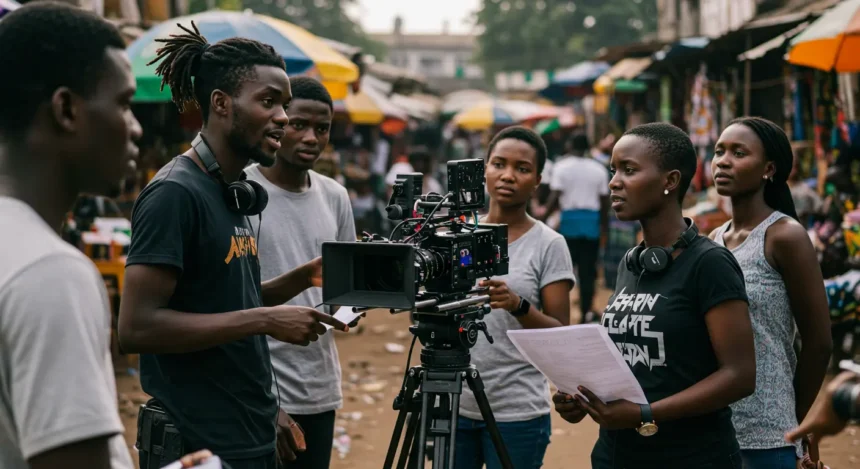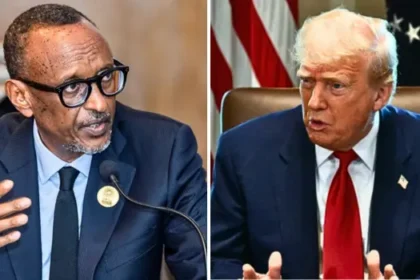I am an Economics student at the University of Ibadan but I live in an estate on Adeniyi Jones, Ikeja, Lagos. Every time I get a chance to come home for a few days or on holidays, I notice something interesting. It intrigues me. It fascinates me. Makes me curious. It is the many very young people I meet around my estate clutching phones and cameras shooting what appears to be skits or armature movies, but in fact, are unknowingly upending the movie industry. Yes. Gen Zees are redefining the practice and the market.
Nollywood, once famous for churning out low-budget dramas and melodramas on VCDs and satellite TV, is experiencing a revolution – and Gen Z is leading the charge. From Lagos to London, a new wave of young Nigerian filmmakers is breaking old moulds, rewriting scripts, and redefining what it means to tell African stories in the 21st century.
These filmmakers aren’t just inheriting Nollywood; they’re disrupting it.
Take Jadesola Osiberu, for instance – the trailblazing director behind “Gangs of Lagos” and “Sugar Rush.” Her work showcases high production values, complex characters, and themes that resonate deeply with Nigeria’s youthful, urban population. She is reported to have said in a panel discussion during the 2023 Africa International Film Festival that, “We grew up watching Nollywood, but we want more. We want stories that reflect the world we live in now – raw, honest, and global.” Jade’s films are set to stream exclusively on Amazon Prime Video.
But the real story is not just about star names. It’s about the indie creators shooting short films on smartphones, distributing them via YouTube, Prime Video, and TikTok, and building global fan bases – all without the blessing of a traditional studio.
One such breakout voice is Nora Awolowo, a young filmmaker and documentary storyteller whose use of minimal equipment and powerful narratives has earned her widespread acclaim on digital platforms. Her content, often under 15 minutes, attracts thousands of views and tackles everything from gender inequality to youth unemployment – issues Gen Z care deeply about.
Streaming platforms like Netflix and Amazon Prime Video have also played a transformative role. Through their “Nollywood Originals” programs, they are commissioning bold, diverse stories and giving young talents a global stage. The rise of low-cost distribution means young filmmakers no longer need a cinema release to go viral – just good storytelling and an understanding of their audience.
In fact, Gen Z filmmakers are deeply in tune with their viewers. “They don’t just make movies; they start conversations,” says Chika Nwobi, founder of Decagon Studios. For him the new phenomenon in the film industry is such that a film trailer drops on TikTok, and by evening it’s trending. It’s more like a community-led phenomenon.
Social media is acting as both cinema hall and critic circle. TikTok edits, reaction videos, fan fiction, and meme culture now form part of a film’s marketing campaign – often before the film is even released. A strong TikTok presence can drive viewership more than a billboard in Lekki.
A recent case in point is “Shanty Town,” a Netflix original that sparked viral conversations across social media with its gritty visuals and dramatic storytelling. Even before its official release, edited clips and trailer reactions dominated TikTok and Instagram Reels, pushing the title to the top of Nigeria’s Netflix chart in its debut weekend.
What’s more? These new-age creators are leveraging crowd-funding platforms like Patreon and Kickstarter, as well as brand collaborations, to fund their work. Tech tools like AI-assisted editing software, Canva for visual design, and mobile-first shooting kits have reduced the cost of entry, allowing anyone with a compelling idea to make a mark.
Young directors are also finding creative ways to earn from their content. Some release short films episodically on Instagram and YouTube, securing sponsorship deals with fashion brands or tech companies who want to be associated with edgy, youth-driven storytelling.
There’s also a noticeable genre shift. Instead of just love triangles and family drama, we now see stories on mental health, migration, LGBTQ+ issues, tech startups, and even futuristic Afro-science fiction. These stories aren’t just entertainment; they’re activism, social commentary, and cultural preservation.
“The lines between cinema and content creation have blurred,” says Mary Njoku, actress and CEO of ROK Studios. “Younger filmmakers are content entrepreneurs. They understand engagement metrics, influencer marketing, and virality. That’s something old Nollywood never had.”
And they’re not doing it alone. Collaborative co-working spaces like The Nest Hub and Surreal 16 Collective in Lagos are incubating these talents. Weekly pitch nights, open-screening events, and virtual filmmaking bootcamps provide a sense of community, mentorship, and structure to what was once an isolated hustle.
Still, challenges remain. Limited access to funding, lack of formal training, piracy, and inconsistent streaming payouts continue to plague independent creators. Yet, if the past five years are any indicator, the movement is only just beginning.
Gen Z filmmakers are not just trying to make it in Nollywood – they are redefining it. With digital tools, global platforms, and grassroots energy, they’re creating a new cinematic language that speaks directly to their generation.
So next time you stumble on a short film on YouTube or a movie trailer trending on TikTok, don’t scroll past. You might just be witnessing the next Osiberu, the next Kunle Afolayan, or the next big revolution in African cinema – born from data, driven by passion, and powered by Gen Z.







